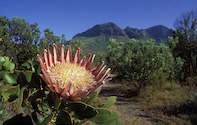
Conservation organisations around the world are hailing the signing of the Kyoto Protocol as the first step towards slowing down global warming, but many say that more stringent measures must be put into place to prevent climate change reaching dangerous levels.
The Kyoto Protocol was signed into effect on February 16, 2005 and legally obliges 35 industrialised countries to reduce their carbon dioxide emissions. By 2012, emission levels must be at least five percent below what they were in 1990. However, Greenpeace believes that by 2020 emissions should drop by at least 30 percent below 1990 levels, and 60-80 percent by 2050.
They believe that this is the only way to keep global temperatures from increasing by two degrees, an amount that many climatologists believe would have catastrophic consequences. The Protocol allows for industrialised countries to buy and sell carbon emission credits amongst themselves. Developing countries that start projects that reduce emissions will also be given encouragement through investment in the projects.
The developed world intends to help developing countries cope with climate change by the formation of the Protocol's Adaptation Fund. However, the United States and Australia have refused to sign the protocol. The United States is the world's biggest emitter of greenhouse gases.
South Africa as a developing nation has not signed the protocol, but minister of environmental affairs and tourism Marthinus van Schalkwyk has said, "Though the protocol does not bind the developing world on the reduction of gas emissions, the challenge for South Africa in particular in the coming decades will be to diversify our energy dependence - developing alternative renewable and non-carbon based sources of energy." He said that government had growing concerns about climate change.
"Predictive modelling shows that over the next few decades, apart from moderate rises in global temperatures, there is likely to be a significant increase in the number of extreme weather events experienced by countries like South Africa - such as droughts, floods, increased incidents of malaria cases, and changes in rainfall patterns, resulting in reduced rainfall especially in the western parts of our country. These effects will impact negatively on our agricultural resources and biodiversity, especially in vulnerable regions like the Cape Floristic Kingdom, which is unique to South Africa."

